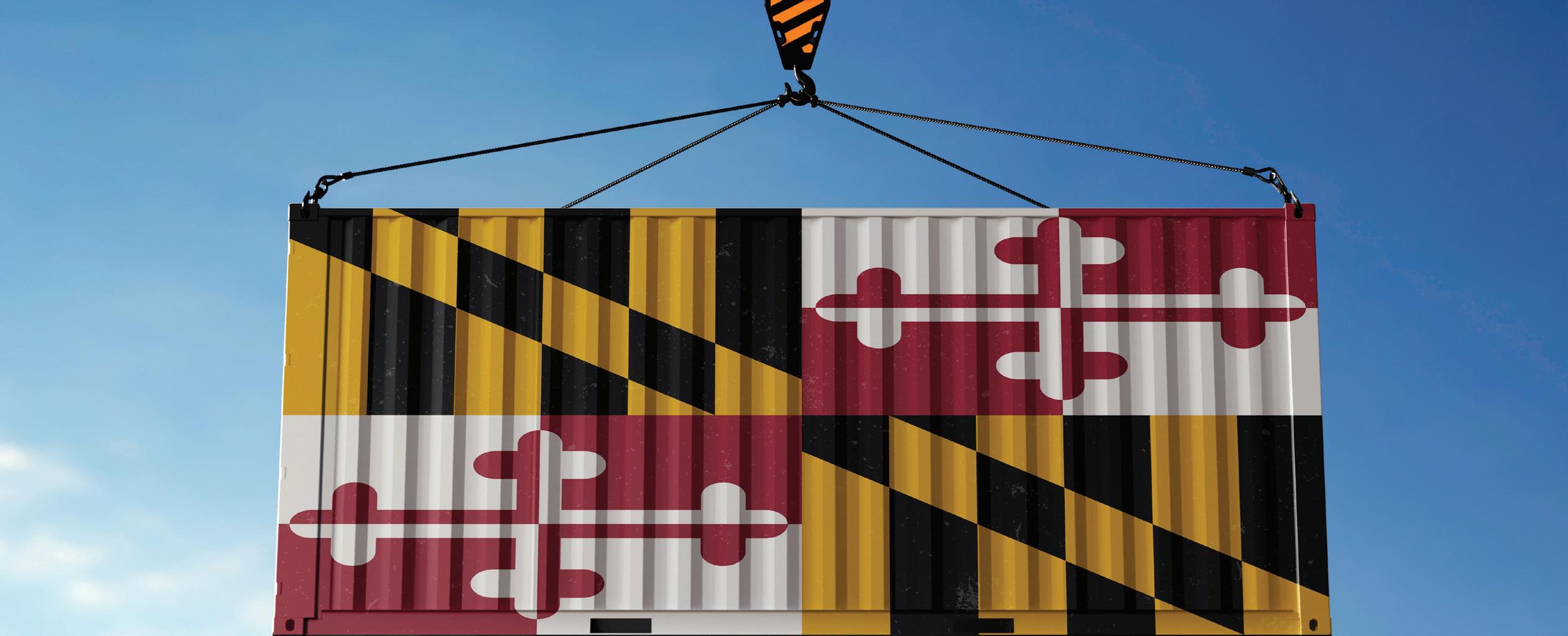
5 minute read
Business Forward Maryland: Your Hub for Innovation
BY DAVID FRITZ
Maryland, often called “America in Miniature,” boasts a diverse landscape and a dynamic economy that mirrors the multifaceted industries seen nationwide. From biotechnology to cybersecurity, maritime to manufacturing, Maryland’s economy is a testament to its innovative spirit and strategic geographical advantage.
Strategic Location and Infrastructure
Maryland’s proximity to Washington, DC, makes it a prime location for businesses seeking access to federal agencies, policymakers, and funding opportunities. The state benefits from a robust infrastructure, including the Port of Baltimore—one of the busiest ports on the East Coast—and three major airports, which collectively support global trade and connectivity.
Additionally, Maryland’s highway and rail networks provide seamless transportation for goods and commuters. This connectivity positions Maryland as a logistical powerhouse, attracting businesses that require efficient supply chain management and international trade access.
Biotechnology and Life Sciences
Maryland is a national leader in biotechnology and life sciences, a sector fueled by its world-class research institutions. The state is home to renowned organizations such as the National Institutes of Health (NIH), Johns Hopkins University, and the University of Maryland. These institutions provide cutting-edge research that has fostered innovations in medical technology, pharmaceuticals, and genomics.
Maryland’s biotechnology companies, such as Emergent BioSolutions and Novavax, have been instrumental in addressing global health crises, including COVID-19. The state’s commitment to life sciences is supported by initiatives like the Maryland Stem Cell Research Fund, which promotes groundbreaking research and commercialization.
Cybersecurity and Technology
Known as the “Cyber Capital of America,” Maryland has a significant presence in the cybersecurity industry. The state hosts key federal agencies, including the National Security Agency (NSA) and the U.S. Cyber Command, which anchor a thriving ecosystem of technology firms and startups.
Maryland’s cybersecurity cluster benefits from a steady pipeline of talent graduating from institutions like the University of Maryland, Baltimore County (UMBC), and Capitol Technology University. The state also offers tax credits and grants to support cybersecurity firms, ensuring continued growth in this high-demand industry.
Maritime and Manufacturing Sectors
Maryland’s manufacturing and maritime industries are critical pillars of its economy. The Port of Baltimore specializes in handling automobiles, containers, and bulk cargo, contributing billions of dollars annually to the state’s economy.
Meanwhile, advanced manufacturing is experiencing a renaissance in Maryland, with companies adopting cutting-edge technologies like 3D printing and robotics.
Aerospace, defense, and electronics manufacturing are particularly prominent, supported by Maryland’s proximity to federal defense agencies and military installations.
Small Business and Entrepreneurial Ecosystem
Maryland fosters a supportive environment for small businesses and startups. Programs like the Maryland Small Business Development Center (SBDC) and TEDCO (Technology Development Corporation) provide entrepreneurs with resources, mentorship, and funding opportunities.
The state’s Innovation Hub initiative encourages collaboration between academia, industry, and government, creating ecosystems that accelerate the commercialization of new technologies. This focus on entrepreneurship ensures Maryland remains competitive in attracting innovative ventures.
Agriculture and Renewable Energy
Though Maryland is known for its urban hubs, its agricultural sector remains vital. The state produces poultry, dairy, and specialty crops like wine grapes and blue crabs, which are integral to Maryland’s cultural identity and economy.
Maryland is also a leader in renewable energy, particularly offshore wind and solar power. The state’s Renewable Portfolio Standard (RPS) aims to achieve 50% clean energy by 2030, positioning Maryland as a model for sustainable economic growth.
Education and Workforce Development
Maryland’s highly educated workforce is a cornerstone of its economic success. The state ranks among the top in the nation for the percentage of residents with advanced degrees. Institutions like Johns Hopkins, the University of Maryland, and community colleges provide workforce training tailored to high-demand industries.
To address skills gaps, Maryland has launched initiatives like the Workforce Development Sequence Scholarship and apprenticeship programs. These efforts ensure a steady supply of qualified professionals across diverse sectors.
Diversity and Inclusion in Economic Growth
Maryland’s economic development strategy emphasizes diversity and inclusion. The state supports minority-owned businesses through initiatives like the Maryland Minority Business Enterprise (MBE) Program, which ensures equitable participation in state contracts. This commitment to diversity strengthens the state’s social fabric and economic resilience.
Challenges and Opportunities
While Maryland’s economic development story is one of success, challenges remain. Rising housing costs and transportation congestion pose obstacles to sustaining growth. Additionally, disparities in economic opportunity across regions highlight the need for targeted investments in rural and underserved communities.
However, Maryland’s focus on innovation, sustainability, housing affordability, and workforce development provides a strong foundation for addressing these challenges. By leveraging its strengths in technology, research, and education, the state is well-positioned to continue thriving in an increasingly globalized economy.
Maryland’s economic development is a dynamic blend of tradition and innovation. From its bustling port and agricultural roots to its cutting-edge biotech and cybersecurity industries, Maryland exemplifies the potential of a diverse and inclusive economy. As the state continues to invest in infrastructure, education, and sustainability, it remains a beacon of economic opportunity on the East Coast and beyond. When you are working with corporate customers, you have tremendous resources at the Maryland Department of Commerce and your local county economic development partners.
David Fritz, CCIM, SIOR, is a Principal at NAI KLNB and is the Chair for Maryland REALTORS®’ Commercial Alliance committee.










